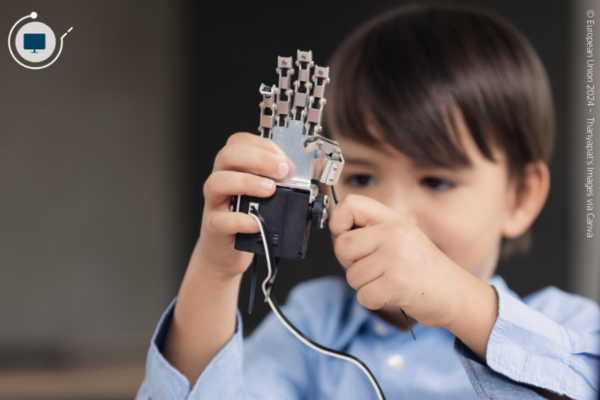Collaborative learning using digital technologies

The online course ran between May and June 2024 and is still available for browsing. As part of the course, participants designed a learning activity focused on collaborative learning using digital technologies. Throughout the course, participants learned how to use digital technologies to innovate their teaching and students’ learning strategies.
The activities below have been reviewed and curated by the course coordinator. A big thank you to the authors:
Abeer Sahin, Catarina Silva, Emiliana Rufo, Maria Goreti Alves, Silvia Mayo Ruiz, and Slavica Bernatović.
- Age group: Lower and upper secondary education, 12-18 years
- Subjects: all
- Published by: European School Education Platform
- Year: 2024
- Languages available: English
Headline Remix: Telling a story with click worthy titles
Age category: 12-13-year-olds
In this innovative English lesson for 12-13-year-olds, students will collaboratively rewrite news headlines to make them clear, concise and engaging. Using a digital platform such as Google Docs or Padlet, students will work in small groups to analyse and revise the headlines of assigned news articles.
The lesson includes a discussion about the importance and ethics of headlines, an introduction to online collaboration tools and a group activity focused on effective, creative titles. This activity enhances critical thinking, summarising and collaborative writing skills, while integrating digital literacy.
Download the "Headline Remix" lesson plan
Author: Abeer Shahin
Arts and Culture
Age category: 14-16-year-olds
In this two-part lesson on arts and culture for 14-16-year-olds, students will explore cultural concepts and differences, focusing on food habits. Using a range of digital tools, students will brainstorm, discuss and create collaborative projects.
The first lesson involves defining culture and discussing its elements, while the second focuses on analysis of eating habits around the world. Students will remotely comment on cultural images and collaboratively create videos about their food traditions. This engaging, active-learning approach enhances students' critical thinking, communication and digital literacy skills.
Download the "Arts and Culture" activity plan
Author: Catarina Silva
Exploring New Zealand
Age category: 12-13-year-olds
This Content and Language Integrated Learning lesson for lower secondary ESL students integrates history, geography and cultural heritage with English language learning. Using a combination of flipped learning and collaborative activities, students will research and explore New Zealand's geography, culture and unique flora and fauna. They will interact with an AI chatbot to plan a virtual trip and create digital presentations.
The lesson aims to enhance students' English proficiency, digital skills, cultural awareness and social skills through active learning and personalised engagement.
Download the "Exploring New Zealand" activity plan
Author: Emiliana Rufo
Earth day walk
Age category: 12-14-year-olds
In this month-long project learning scenario for 12-14-year-olds, participants will organise and execute an Earth Day walk to promote sustainability. Integrating citizenship, natural sciences, geography and physical education, students will plan the event, focusing on the importance of ecosystems, the impact of human activities and possible measures to mitigate environmental damage.
They will collaborate in small groups to research and present a variety of sustainability topics. This project aims to develop participants' critical thinking, creativity and collaboration skills.
Download the "Earth’s day walk" activity plan
Author: Maria Goreti Alves
Find a fossil
Age category: 15-17-year-olds
This 90-minute lesson, designed for 15-17-year-olds, explores fossils and their significance in our understanding of the Earth's history. It integrates basic competences in science and technology, emphasising interpretation of historical records and the scientific process. Students work in groups, using digital tools and resources to investigate fossils, formulate questions and create infographics.
Teachers guide the discussions, provide resources, and assess progress with rubrics. Using group presentations, peer feedback and self-assessment, the lesson culminates in a reinforcement activity to consolidate what has been learned.
Download the "Find a fossil" activity plan
Author: Silvia Mayo Ruiz
Digital tools in physics
Age category: 14-18-year-olds
The lesson plan focuses on teaching Archimedes' law using digital tools to enhance student engagement and learning outcomes. Over three 45-minute sessions, students will perform experiments, collect data and analyse results using tools such as Google Sheets, LearningApps and YouTube. The activities develop students' research, STEM and digital skills, fostering critical thinking and collaboration.
The teacher will provide digital materials and guidance while students conduct experiments and present findings in groups. Self-assessment and interactive quizzes ensure comprehension, integrating digital competencies into the physics curriculum.
Download the "Digital tools in physics" activity plan
Author: Slavica Bernatović
Image credits: Except where otherwise stated, all pictures come from Pexels.com and Unsplash.com.
Additional information
-
Age from:12
-
Age to:18
-
Education type:School Education
-
Target audience:TeacherStudent TeacherTeacher Educator
-
Target audience ISCED:Lower secondary education (ISCED 2)Upper secondary education (ISCED 3)






